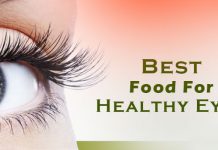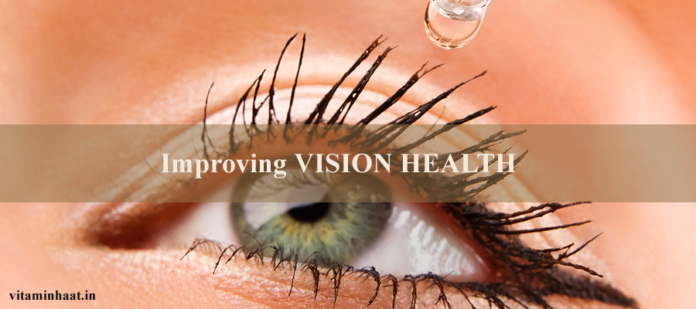Don’t take your eyes for granted. Protect your vision health with these six tips:
1. Eat for Good Vision Health
Caring your vision health starts with the food on your plate. Nutrients such as omega-3 fatty acids, lutein, zinc, and vitamins C and E might improve ward off age-related vision problems such as macular degeneration and cataracts, studies show. Habitually eating these foods can help lead to good vision health:

- Green, leafy vegetables such as spinach, kale, and collards
- Salmon, tuna, and other fatty fish
- Eggs, nuts, beans, and other non-meat protein sources
- Oranges and other citrus fruit juice
- Oysters and pork
Eating a well-balanced diet also helps you maintain a healthy weight, which makes you less possible to get obesity-related diseases such as type 2 diabetes. Diabetes is the leading cause of sightlessness in adults.
2. Quit Smoking
Smouldering makes you more likely to get cataracts, optic nerve damage, and macular degeneration. If you’ve tried to left smoking before and started smoking again, keep trying. The more times you try to quit smoking, the more likely you are to achieve.
3. Wear Sunglasses
The right kind of sunglasses will help protect your eyes from the sun’s ultraviolet (UV) rays.
Too much UV coverage makes you more likely to get cataracts and macular degeneration.
Choose sunspecs that block 99% to 100% of both UVA and UVB rays. Wraparound lenses help protect your eyes from the side. Polarized lenses decrease glare when driving.
If you wear contact lenses, some offer UV protection. It’s still a good plan to show sunglasses for more protection, though.

4. Use Safety Eyewear
If you work with hazardous or airborne tools on the job or at home, wear safety glasses or protective goggles every time.
Certain sports such as ice hockey, racquetball and lacrosse can also hint to eye injury. Wear eye protection (such as helmets with protective face masks or sports goggles with polycarbonate lenses) to care for your vision health.
5. Look Away From the Computer Screen
Staring at a computer screen for too long can affect:
- Eyestrain
- Blurry sight
- Trouble focusing at a distance
- Dry eyes
- Headaches
- Neck, back, and shoulder pain
Selecting the following steps to protect your vision health:
- Make sure your glasses or contact lens prescription is up-to-date and suitable for computer use.
- Some people may need glasses to help with contrast, glare, and eye strain when using a computer.
- Location your computer so that your eyes are level with the top of the monitor. This allows you to look a little down at the screen.
- Try to avoid glare on your computer from windows and lights. Use an anti-glare display if needed.
- Choose a comfortable, supportive chair. Position it so that your feet are flat on the floor.
If your eyes are dull, blink more. - Every 20 minutes, rest your eyes by looking 20 feet away for 20 seconds. At least every 2 hours, get up and secure a 15-minute break.
6. Visit Your Eye Doctor Regularly

Everyone, even young children, should get their eyes examined frequently. It helps you protect your sight and see your best.
Eye exams can also find some eye infections, such as glaucoma, that have no symptoms. It’s important to find these diseases early on, when they’re comfortable to treat.
Depending on your vision health needs, you can see either an optometrist or an ophthalmologist for an eye test. Ophthalmologists are medical doctors who specialize in eye care. They can provide general eye maintenance, treat eye diseases, and perform eye surgery. Optometrists have had 4 years of specialized training after college. They provide general eye care and treat the most common eye diseases. They don’t do eye surgery.
A comprehensive eye exam might include:
- Talking about your individual and family medical history
- Taking vision tests to see if you have near sightedness, farsightedness, astigmatism (a curled cornea that blurs vision), or presbyopia (age-related vision changes)
- Tests to see how healthy your eyes work together
- Eye pressure and optic nerve tests to check if you have glaucoma
- External and microscopic check of your eyes before and after dilation
Submit your review | |

![Best 5 Health Supplement Website Online in India [2018] best health supplement website](http://www.vitaminhaat.in/wp-content/uploads/2018/08/best-health-supplements-websites-218x150.jpg)






















